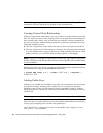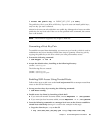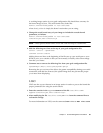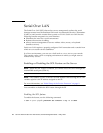
Chapter 4 Further Management Information 65
A working-image section in your grub configuration file should have an entry for
the kernel image to boot. The stock kernel entry looks like:
kernel /vmlinuz-kernel_revision ro root=/dev/sda5
where kernel_revision is simply the kernel version that you are using.
1. Change the stock kernel entry of your image to include the console-kernel
parameters, as follows:
kernel /vmlinuz-kernel_revision ro root=/dev/sda5
console=ttyS0,9600 console=tty0
Note – These options should all be on one line with no wrap to a second line.
2. Add the following two lines to the top of your grub configuration file:
serial --unit=0 --speed=9600
terminal serial console
Adding these two lines at the beginning of the file sets up your serial port or your
KVM as your grub console so that you can remotely or locally select a boot image
from the grub menu.
3. Comment out or remove the following line from your grub configuration file:
splashimage=(hd0,1)/boot/grub/splash.xpm.gz
Removing the splashimage line allows for greater compatibility during your serial
connection; with this line removed, the splash image does not prevent the proper
grub menu from displaying.
LILO
LILO uses the append feature in an image section in order to pass to the kernel the
proper parameters for using the serial console.
1. Enter the consoles in the append statement of the file /etc/lilo.conf:
append="console=ttyS0,9600 console=tty0"
2. After modifying the file /etc/lilo.conf, run lilo from the command line to
activate the change.
For more information on LILO, run the commands man lilo or man lilo.conf.


















